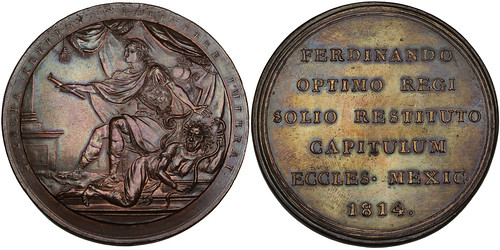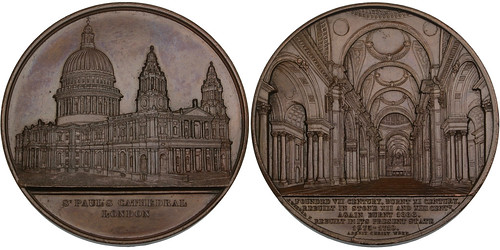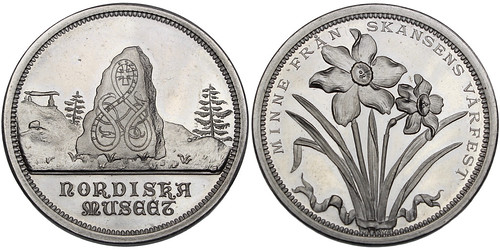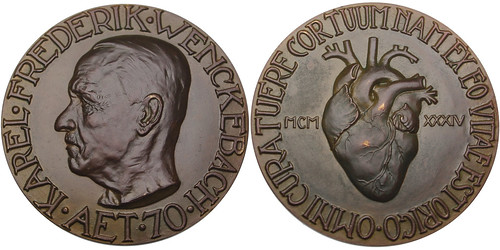
PREV ARTICLE
NEXT ARTICLE
FULL ISSUE
PREV FULL ISSUE
NUMISMAGRAM MEDAL SELECTIONS: FEBRUARY 2019Jeremy Bostwick at Numismagram passed along these four highlights from his most recent upload of European art and historical medals to his website. In addition to the pieces below, be sure to look for a few more attractive architectural types, two extremely rare and prooflike silver medals from Brandenburg, a Charles Darwin evolution medal, three railroad types for the train enthusiast, and a few other gorgeously toned pieces. -Editor Mexico Fernando VII Medal  100548 | MEXICO. Fernando VII bronze Medal. Issued 1814. Proclamation issue: The cabildo eclesiástico (ecclesiastical council) at Mexico City (51mm, 50.75 g, 12h). By J. M. Guerrero. FERDINANDO / OPTIMO REGI / SOLIO RESTITUTO / CAPITULUM / ECCLES MEXIC / 1814 in six lines / SUBACTA PERFIDIA FELICITER IMPERAT, Fernando, holding baton, seated left on throne within a draped enclosure; to lower right, figure of Discord (as a gorgon) prostrate right, holding serpent with both hands. Edge: Plain. Grove F-23c. Mint State. Pleasing red-brown surfaces, with underlying luster and hints of cobalt throughout; some scattered, unobtrusive light marks are noted for completeness. Compare to a similar specimen, which realized a hammer of $1,300 (plus buyer's fee) in CNG 96 (14 May 2014), lot 1458. $895. Fernando ascended to the Spanish throne, as well as that of her colonies, following the abdication of his father, Carlos IV, in March 1808. Shortly thereafter, Fernando himself abdicated and looked to Napoleon I for aid. The latter held the former "under guard" for over five years at the Chateau de Valençay, a property owned by Napoleon's former foreign minister Talleyrand. During this time, Napoleon installed his brother, Joseph, as king–a move which was never accepted by the Spanish people nor her colonies. In Mexico, for example, coins continued to be struck in the name of Fernando, still recognized as the true Spanish king. Fernando was eventually allowed to return to the Spanish throne late in 1813, as Napoleon faced bigger issues closer to home. This particular medal was issued just after Fernando's return, showing him casting aside an allegorical representation of Discord–emblematic of the chaos ushered in by the Napoleonic Wars. Nice medal. -Editor To read the complete item description, see: St. Paul's Cathedral Medal  100567 | GREAT BRITAIN. St. Paul's Cathedral bronze Medal. Issued 1849. Architectural series: St. Paul's Cathedral in London (59mm, 97.17 g, 12h). By J. Wiener in Brussels. Perspective frontal view of the cathedral; St PAUL'S CATHEDRAL / LONDON in two lines in exergue / Ornate perspective interior view of the gallery designed by Sir Christopher Wren; in three lines in exergue, FOUNDED VII CENTURY, BURNT XI CENTURY / REBUILT IN STONE XII AND XIII CENTy / AGAIN BURNT 1666 / REBUILT IN ITS PRESENT STATE / 1675–1710. Edge: Plain. Van Hoydonck 49; Eimer 1505. Choice Mint State. Rich chocolate brown surfaces, with a high degree of underlying luster. Extremely attractive architectural type. Compare to similar examples in Stack's Coin Galleries 18 August & 9 December 2009 auctions, lots 6039 & 1183 (which realized hammers of $700 and $650 [plus buyer's fee], respectively). $435. Originally founded in 604, the cathedrals that have stood in the location of St. Paul's have been destroyed by fire numerous times during the middle ages, with the "Old St. Paul's" famously being a calamity during the Great Fire of London in 1666, of which it was one of nearly 90 churches destroyed by the massive conflagration. Sir Christopher Wren was tasked with rebuilding many of these structures, St. Paul's being the crown jewel. This present version was officially consecrated in 1697, some 31 years after the Great Fire. During World War II, the cathedral did suffer some damage from German bombings, but survived mostly without issue. St. Paul's is a masterpiece. I greatly enjoyed touring it during my time living in London. Excellent architectural medal. -Editor To read the complete item description, see: Sweden Spring Festival Medal  100565 | SWEDEN. Stockholm aluminum Medal. Issued 1894. Commemorating the initial Vårfest (spring festival) held at Skansen (31mm, 4.09 g, 12h). By A. Högel. A Skansen runestone, carved with a cross, serpents, and runes reading "KIIN ÞIK SIALFAN" (know thyself); NORDISKA / MUSЄЄT in two lines in exergue / MINNE FRÅN SKANSENS VÅRFEST (to commemorate the spring festival at Skansen), two daffodils tied near their base. Edge: Plain. Choice Mint State. Exceptionally lustrous and prooflike. An early use of aluminum for medals. $145. In an effort to create more interest in a Swedish national day, Artur Hazelius, the founder of the Nordiska Museet (Nordic Museum) and the Skansen, Sweden's first open-air museum and zoo located on the island of Djurgården in Stockholm, planned a vårfest (spring festival) to be held at Skansen. This fest had its final day on 5 June, with 6 June already being recognized as Gustafsdagen (Gustav's Day). Eventually, the latter became Sweden's national day, being known as Swedish Flag Day until 1983, then simply as Sveriges nationaldag (Swedish national day). For more information on this medal and the vårfest,, see Svensk Numismatisk Tidskrift 4 (2011), p. 83. Hey, I'm half Swedish, so I have to like this one. -Editor To read the complete item description, see: Cardiologist Frederik Wenkenbach Medal  100588 | NETHERLANDS. Karel Frederik Wenkenbach bronze Medal. Issued 1934. Commemorating the 70th birthday of the cardiologist, anatomist, and professor of medicine (50mm, 51.61 g, 12h). By O. Wenckebach. • KAREL • FREDERIK • WENCKEBACH • / AET • 70, bare head left / OMNI CURA TUERE CORTUUM NAM EX EO VITAE EST ORIGO (Protect your heart with all your care, for that is the origin of life), human heart. Edge: Plain. Gem Mint State. Attractive deep brown matte surfaces, with just a hint of rub on the highest points. Splendid and rare Medicina in Nummis type. $225. Wenkenbach was an important cardiologist and professor of medicine at the Universities of Groningen, Strasbourg, and Vienna for the first three decades of the 20th century. In addition to his university work, he contributed greatly to the workings of the human heart, writing about the "second degree AV block," later becoming known as the "Wenckebach phenomenon" in honor of him, as well as describing the "middle internodal tract," later becoming known as the "Wenckebach's bundle," also in his honor. I've had friends and family members undergo heart transplant surgeries, so this pioneering research is great to learn about. There aren't many medals picturing a human internal organ. -Editor To read the complete item description, see:  Wayne Homren, Editor The Numismatic Bibliomania Society is a non-profit organization promoting numismatic literature. See our web site at coinbooks.org. To submit items for publication in The E-Sylum, write to the Editor at this address: whomren@gmail.com To subscribe go to: https://my.binhost.com/lists/listinfo/esylum All Rights Reserved. NBS Home Page Contact the NBS webmaster 
|